
Precision and Accuracy: The Importance of Lab Weighing Scales in Scientific Research
If you knew that a pharmaceutical company used an industrial platform scale to formulate their medicines, would you purchase their products? I hope not! For highly sensitive and precise applications such as those performed in laboratories, the only acceptable scale is a lab weighing scale. What is a lab weighing scale, and why is it so important to be accurate and precise in scientific research? This blog will explain.
What is a Lab Weighing Scale?
Laboratory scales are scales that are specifically crafted with scientists in mind, offering advanced precision and accuracy. The most common scales used in laboratories are precision, analytical and semi-micro scales. You’ll also find that they are more commonly referred to as precision balances, analytical balances and semi-micro balances.
Precision scales typically have the highest capacity out of the three, so they’re ideal for weighing larger objects such as blood bags or beakers with chemical solutions in them that don’t require absolute precision. Analytical balances are the next step up, with better readabilities - as much as to the 5th decimal place - but lower capacities as well. These are perfect for measuring the mass of smaller samples with very high accuracy.
Micro balances are the most accurate and precise option that we offer at Inscale. At their highest sensitivity, microbalances can measure mass to a hundred-thousandth of a gram, which is incredible precision.
The Importance of Precision and Accuracy in Scientific Research
Much of the work done in laboratories involves preparing samples, determining density or performing tests on small quantities of items, thus the readability needs to be as accurate as possible. The higher the capacity on a scale, the less accurate the readability, so these implementations require a lab scale with a low capacity so that the readability is precise enough. In the case of formulating pharmaceuticals, for example, being inaccurate by any means may result in disastrous consequences if too much or too little of a particular chemical is included.
How Lab Weighing Scales Ensure Precision and Accuracy
The more accurate the readability is on a scale, the more sensitive to any outside disruption it becomes, thus the more features are included in order to overcome and reduce these disruptions. For example, analytical and microbalances are susceptible to being affected by air currents, electrical charges and vibrations. Most analytical balances will come equipped with a draught shield, but if you’re in a place where electrical charges or vibrations are a concern, accessories such as an ioniser or anti-vibration table are very helpful. Microbalances commonly offer a draught shield as well as a built-in ioniser.
To ensure the level of accuracy and precision you require, your laboratory weighing equipment will require regular and frequent calibration with calibration weights. Some may prefer to calibrate their balance before every session. Regular maintenance, such as cleaning the balance after use, is also highly recommended.
Choosing the Right Lab Weighing Scale
Let’s look at our top five weighing scale options for your laboratory.
Precision Balances
Adam Equipment ‘Equinox’ Precision Balance
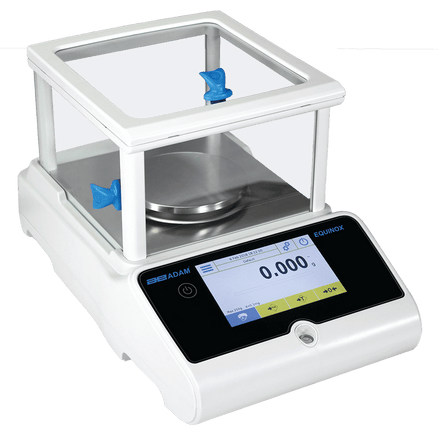
Capacities: 360g – 8200g
Readabilities: 0.001g – 0.01g
Adam’s ‘Equinox’ Precision Balance is designed to perform highly detailed testing in a laboratory. With selectable digital filtering as well as a draught shield, the Equinox is less susceptible to disturbances from vibrations and air currents, making your results more reliable. A touchscreen display provides an advanced and smooth operating experience, with readily accessible applications and functions and excellent clarity.
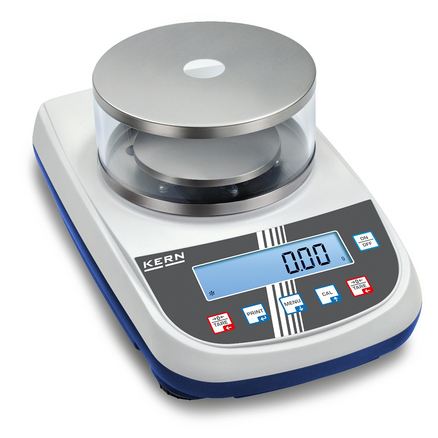
Capacities: 420g – 20kg
Readabilities: 0.001g – 0.1g
The Kern PLS Precision Balance offers models with high capacity, suitable for weighing larger objects when necessary. The PLS features a unique recipe weighing feature, it can store up to 99 recipes and 20 recipe ingredients with their names and target values. The PLS also comes equipped with checkweighing and parts counting functions to speed up any repetitive weighing tasks.
Analytical Balances
Adam ‘Equinox’ Analytical & Semi-Micro Balance
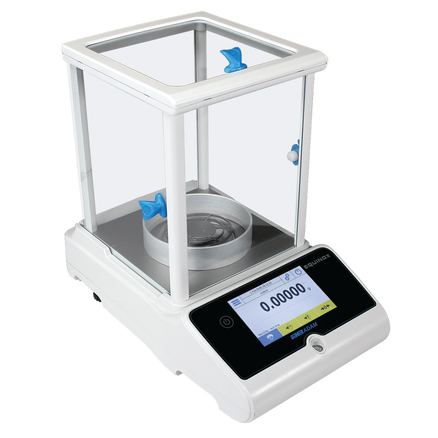
Capacities: 120g – 510g
Readabilities: 0.0001g – 0.01mg
That’s right, Adam also offers an Equinox Analytical & Semi-Micro Balance. Despite its remarkable precision and accuracy, operating the Equinox is as simple as following the step-by-step instructions provided on the touchscreen display. This makes accessing and taking advantage of advanced weighing functions such as parts counting, formulation, peak hold, density determination, checkweighing, dynamic animal weighing, and percentage weighing a breeze.
Adam ‘Luna’ Analytical Balance
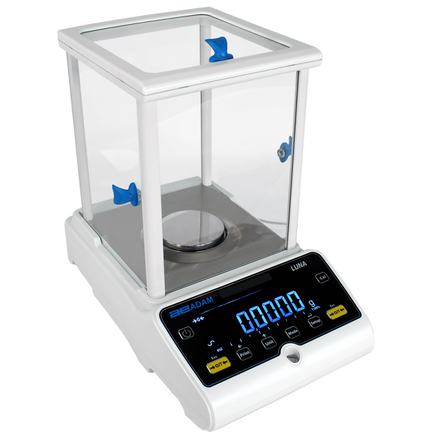
Capacities: 80g – 250g
Readabilities: 0.0001g
For those who have no desire to deal with the sensitivity a semi-micro balance typically causes and would also like a slightly more affordable option, Adam’s ‘Luna’ Analytical balance is the right choice for you. Luna offers highly accurate weighing while also featuring a sealed keypad that protects against dirt and spills. Connect the Luna to your computer or a printer via the USB and RS-232 interfaces, so you can record your results with ease.
Semi-Micro Balance
A&D BM Semi-Micro Analytical Balance
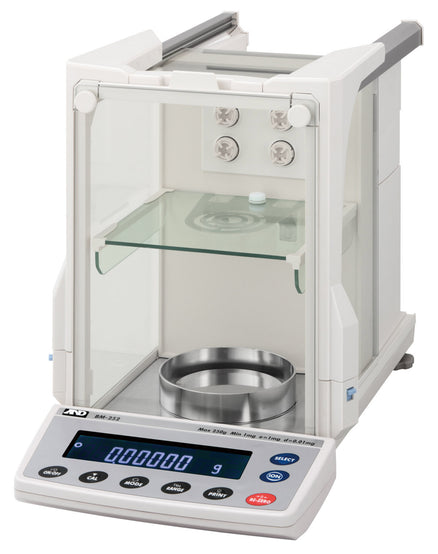
Capacities: 22g – 520g
Readabilities: 0.001mg – 0.0001g
A&D’s BM Semi-Micro Analytical Balance is the only one of its kind we offer here at Inscale. If you invest in the BM, you’re guaranteed exceptionally high precision. The BM offers a static resistant design, fan-less ioniser, anti-static glass draught shields and evaporated metal coating to protect against electric charge, a commonly fatal source of error. In addition, the BM boasts parts counting, percentage weighing and density determination features. This may be an expensive scale, but you’re truly getting your money’s worth!
Want more information or need help deciding which lab scale is right for you? Contact our team.

Leave a comment